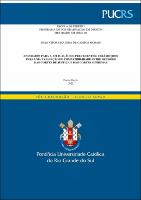| Share record |


|
Please use this identifier to cite or link to this item:
https://tede2.pucrs.br/tede2/handle/tede/10648| Document type: | Dissertação |
| Title: | Standards para a aplicação de precedentes : parâmetros para uma avaliação de compatibilidade entre decisões das cortes de justiça e das cortes supremas |
| Author: | Morais, João Vitor Sequeira de Campos  |
| Advisor: | Reichelt, Luis Alberto |
| Abstract (native): | Este trabalho tem como objetivo investigar a atividade realizada pelos Tribunais Estaduais de Justiça (TJ's) e Tribunais Regionais Federais (TRF's) ao avaliarem a compatibilidade entre o seu acórdão recorrido e a orientação firmada pelo Supremo Tribunal Federal (STF) ou Superior Tribunal de Justiça (STJ) no julgamento de recursos extraordinário e especial repetitivos, conforme dispõe o art. 1.040, incisos I e II do Código de Processo Civil (CPC/15). O problema de pesquisa consiste em indicar a partir de quais standards (parâmetros) pode ser feito, de maneira fundamentada, o exame de compatibilidade que se exprime da norma processual. Pela perspectiva institucional adotada, os TJ's e os TRF's são Cortes de Justiça, ao passo que o STF e o STJ, Cortes Supremas. Sendo assim, uma vez julgado e publicado o precedente, caberá às cortes de origem, em sendo o caso, adequar o acórdão recorrido à orientação fixada pelas Cortes Supremas no julgamento paradigma. Pelo modo como o ordenamento jurídico brasileiro se constitui, são as Cortes de Justiça que dizem se o precedente é aplicável ou não ao caso concreto. É essencial, então, que os TJ's e os TRF's tenham condições de fazer um exame de compatibilidade adequado entre a sua decisão e o precedente. No espaço de análise entre os discursos jurídicos, desenvolve-se uma operação interpretativa e argumentativa cuja finalidade é definir se o acórdão recorrido é compatível ou não com o entendimento da Corte Suprema. Levando isto em conta, os standards configuram um modelo de controle do juízo comparativo entre as decisões, que busca evitar que a discricionariedade judicial da qual dispõem as Cortes de Justiça seja convertida em puro arbítrio. Parte-se do pressuposto de que todas as decisões judiciais precisam ser fundamentadas. Só por meio de um juízo comparativo fundamentado é que os precedentes serão respeitados. |
| Abstract (english): | This thesis has the objective of investigating the activity performed by the State Appelate Courts and the Regional Federal Appelate Courts when evaluating the compatibility between the appelate decision and the orientation defined by the Federal Supreme Court or the Superior Court of Justice in the disposition of repetitive extraordinary and special appeals in accordance with the article 1040, items I and II of the 2015 Code of Civil Procedure. The research problem consists in indicating as of which parameters the compatibility exam expressed by the procedural rules can be taken in a reasoned manner. Through the adopted institutional perspective the State Appelate Courts and the Regional Federal Appelate Courts are Courts of Justice, whereas the Federal Supreme Court and the Superior Court of Justice are Supreme Courts. Therefore, once the precedent has been adjudicated and published is the responsibility of the courts of origin, if necessary, to adjust the appelate decision to the orientation given by the Supreme Courts in the paradigm trial. In the way the Brazilian legal system is constituted, the Courts of Justice are the ones that decide if the precedent is applicable or not to the case at hand. It is essential then, that the State Appelate Courts and the Regional Federal Appelate Courts are able to perform an appropriate compatibility test between their decision and the precedent. In the realm of legal discourse an interpretative and argumentative operation is developed, whose objective is to define if the appelate decision is compatible or not with the understanding of the Supreme Court. Taking that into account, the standards constitute a control model for the comparison between decisions, in order to avoid that the judicial discretion belonging to the Courts of Justice becomes arbitrary. We start from the assumption that every court decision must be reasoned, and that is why such standards are considered substantiated. Only through well-founded comparison between courts is that precedents will be respected. |
| Keywords: | Decisão Judicial Justificação Argumentação Jurídica Standards Judicial Decision Justification Legal Reasoning Standards |
| CNPQ Knowledge Areas: | CIENCIAS SOCIAIS APLICADAS::DIREITO |
| Language: | por |
| Country: | Brasil |
| Publisher: | Pontifícia Universidade Católica do Rio Grande do Sul |
| Institution Acronym: | PUCRS |
| Department: | Escola de Direito |
| Program: | Programa de Pós-Graduação em Direito |
| Access type: | Acesso Aberto |
| Fulltext access restriction: | Trabalho será publicado como artigo ou livro |
| Time to release fulltext: | 18 meses |
| Date to release fulltext: | 28/08/2024 |
| URI: | https://tede2.pucrs.br/tede2/handle/tede/10648 |
| Issue Date: | 9-Jan-2023 |
| Appears in Collections: | Programa de Pós-Graduação em Direito |
Files in This Item:
| File | Description | Size | Format | |
|---|---|---|---|---|
| DIS_JOAO_VITOR_SEQUEIRA_DE_CAMPOS_MORAIS_COMPLETO.pdf | JOAO_VITOR_SEQUEIRA_DE_CAMPOS_MORAIS_DIS | 1.64 MB | Adobe PDF |  Download/Open Preview |
Items in DSpace are protected by copyright, with all rights reserved, unless otherwise indicated.




